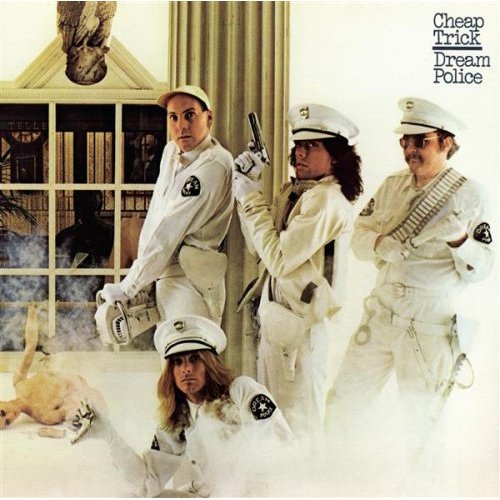
Dream Police (1979)

1.Dream Police
2.Way of the World
3.The House is Rockin'(with Domestic
Problems)
4.Gonna Raise Hell
5.I'll Be With You Tonight
6.Voices
7.Writing on the Wall
8.I Know What I Want
9.Need Your Love
If Heaven Tonight was the moment Cheap Trick perfected their quirky power-pop formula, then Dream Police was the moment they started to stretch it—some might say crack it. Released on the heels of At Budokan,
the album rode a wave of sudden stardom and commercial expectation. It charted in the U.S. Top Ten, a first for the band, and remains one of their biggest sellers.
But success, as always, came with a price. The album sounds like the work of a band aware of its profile—ambitious, polished, but slightly less spontaneous than before.
Though much of it had been recorded before Budokan made them international stars, Dream Police already carries the aftershocks of success. There's a noticeable shift in production,
and the infamous power in their power pop leans more toward arena rock bombast. Keyboards are layered thick across multiple tracks. Orchestral arrangements even creep in.
The edges are smoother, the humor a little more subdued.
Still, when it hits, it hits hard. The title track is as sharp as anything they ever did—tight, nervy, and oddly cinematic. It retains their signature paranoia-drenched lyricism
while adding a more theatrical flair. The House is Rockin’ (With Domestic Problems) and Writing on the Wall are similarly hard-edged and inventive, and
I'll Be With You Tonight
Tom Petersson steps up to the mic for I Know What I Want, and while the song itself has bite, his performance lacks the polish of his bandmates—a charming misfire,
perhaps, but still a misfire. Voices, the requisite ballad, sneaks into the Top 40 and gives Robin Zander room to stretch vocally. It’s lush and sincere, even if it's
arguably more conventional than earlier experiments.
Where the record falters is in its indulgences. Gonna Raise Hell, closing side one, overstays its welcome at over nine minutes, a slow-building groove that promises more than it delivers.
Need Your Love, clocking in just under eight minutes, similarly drags, especially compared to the live Budokan version which pulsed with urgency. On record, both tracks feel weighed down by studio sheen and cautious pacing.
A curious footnote is the album’s orchestration—most evident on the title track and others—which often detracts rather than enhances. Years later, a stripped-down version of the song Dream Police
emerged on a bonus CD release. Minus the orchestral swell, the song breathed easier, sounding more like it belonged on one of their first three albums—raw, taut, immediate.
In the end, Dream Police marks a transition. It's the sound of a band at the edge of transformation, caught between raw energy and mainstream ambition. While the balance sometimes wobbles,
the foundation remains solid. The record has endured, not just as a commercial high point, but as a document of a band at the height of its powers, looking out into a much larger world.
Go back to the main page
Go To Next Review